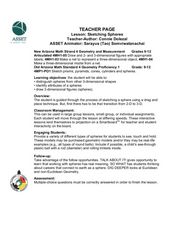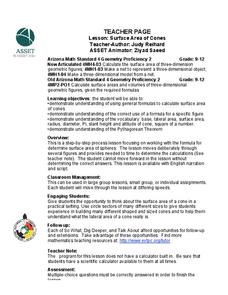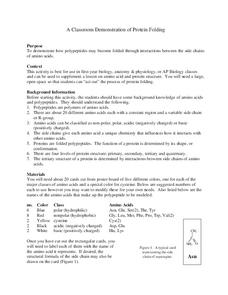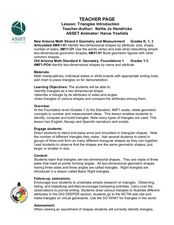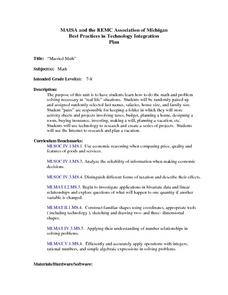Curated OER
Sketching Spheres
Students investigate spheres through sketches. In this geometry lesson, students sketch two and three dimensional shapes creating nets. They find and differentiate between the nets for prisms, pyramids, cones, cylinders and spheres.
Curated OER
Surface Area of Cones
High schoolers find the surface area of cones. In this geometry lesson plan, students calculate the dimensions of each three-dimensional shape and use the correct formula to solve the problem. They relate concepts of cones to the...
Curated OER
Sketching Cylinders
Young scholars create nets of cylinders. In this geometry lesson, students calculate the surface area of cylinders and other solids. They show their understanding of three-dimensional shapes by solving problems.
Curated OER
Sketching Prisms
Students sketch and create nets of different polygons.In this geometry lesson, students differentiate prisms from other three-dimensional shapes. They define the properties of prisms.
Curated OER
Polyhedra Book
In this math activity, students are asked to read the book that focuses upon the creation and explanation of three dimensional shapes.
Curated OER
Using Concept Maps to Design 3D Spheres
Students create three dimensional shapes using concept maps. In this geometry lesson, students investigate the impact of mental schemas on humans. They collect data on this topic and plot their data on a coordinate plane.
Southwestern Medical Center
A Classroom Demonstration of Protein Folding
Does the mention of proteins and polypeptide relationships in your classroom result in mass confusion? Does the attempt to teach this important concept generate multiple questions and, at times, lead to a room filled with blank...
J. Paul Getty Trust
O Greek Shape! O Fair Pose!
Everything old is new again. The Los Angeles J. Paul Getty Museum presents a lesson on how Greek black-figure painting influenced eighteenth century Neoclassical artists. After looking at a series of examples, class members create their...
Curated OER
Simply Symmetry
Students are introduced to the concept of symmetry by examining different shapes and folding them into equal halves. They work in small groups focusing on finding the lines of symmetry of one specific shape. A symmetry booklet is made by...
Curated OER
3-D Figures Part 1
Elementary schoolers explore 3-D shapes. They transition from thinking of shapes as only 2-D. Pupils read Cinderella as a launching activity for their upcoming adventure, and explore a new world of 3-D shapes in this introductory lesson.
Curated OER
Many Colored Maps
In this map worksheet, 6th graders identify and complete 10 different problems that include various dimensional maps. First, they complete the table on the right by coloring the maps found on the bottom. Then, students determine the...
Curated OER
Dimension in Art
Third graders consider space and the techniques artists use to create three-dimensionality within a painting or drawing. They examine works by Millet, Bruegel and Demuth and then create original drawings that explore the effects of...
Curated OER
Spatial Relationships
Students investigate the geometry concept of spatial relationships. They draw a replica of a cube. Students list the planes on the cube and go into further depth with identifying the parallel line in segments of the cube. The...
Curated OER
Triangles Introduction
Students explore geometry by drawing various shapes in class. In this triangle characteristics instructional activity, students identify the attributes that classify a shape as a triangle and practice using their bodies to create...
Curated OER
Surface Area with Polydrons
Students explore measurements by analyzing geometric shapes. In this surface area lesson, students identify the terms volume, weight, perimeter and area in order to find the requested measurements of specific polygons. Students utilize...
Curated OER
Measurement
Seventh graders measure surface area. In this geometry lesson, 7th graders find the surface area of various geometrical shapes. Using a computer program, students compute the area of 2-D and 3-D shapes. Students use...
Curated OER
Geometry Journal: Classifying Solids
In this geometry worksheet, 10th graders respond to journal prompts related to prisms and classifying solid shapes. The two page worksheet contains nine questions. Answers are included.
Curated OER
Whatever Floats Your Boat
Second graders make boats by folding paper. They identify and draw shapes made during the creating process and place lines of symmetry on them. They demonstrate their understanding by completing an activity sheet imbedded in this plan.
Curated OER
Figure It Out - Polygons
Sixth graders explore different polygons. In this polygon lesson, 6th graders examine a rhombus, quadrilateral, parallelogram, and rectangles. Students compare and contrast polygons and research shapes on the Internet.
Curated OER
Geo Jammin' - Day 4, Lesson 15: Geo Jingo Jivin'
Second graders explore how musical instruments h ave varying geometric shape, and how those geometric shapes correspond to three-dimenaional shapes that students have studied.
Curated OER
Volume and Surface Area of Right Rectangular Prisms
Students identify the formulas for three-dimensional figures. They use manipulatives to model problems. Students create foldables and explain volume and surface area. Students complete worksheets and classify solids. Students sing a...
Curated OER
Anything I Can Do You Can Do Better
Students complete a two-week unit involving design and construction concepts. They watch a PowerPoint presentation about geometric shapes, draw the fourteen shapes incorporated in bridge construction, and in small groups design, build,...
Curated OER
Married Math
Students participate in a two-week real-life math unit. In pairs, they calculate salaries, taxes, and a budget, plan a vacation, buy insurance, make a will, and design a room. They conduct Internet research to plan the vacation, and...
Cornell University
Constructing and Visualizing Topographic Profiles
Militaries throughout history have used topography information to plan strategies, yet many pupils today don't understand it. Scholars use Legos and a contour gauge to understand how to construct and visualize topographic profiles. This...
